Program: Evening of Holocaust Remembrance - Readings from the Works of Elie Wiesel at Chapman University
Title
Date
Contributor
Summary
This document is a program for an "Evening of Holocaust Remembrance" held at Chapman University, featuring readings from the works of Elie Wiesel. It includes a detailed biography of Elie Wiesel, highlighting his life as a writer, teacher, Nobel Peace Prize laureate, and human rights advocate, with a focus on his experiences during the Holocaust. The program lists the performers (singers, instrumentalists, and readers) and the creative and production team involved in the event. It presents selected texts from Wiesel's works, emphasizing themes of memory, the Holocaust, and the human capacity to remember and confront oblivion. The event, which included the lighting of remembrance candles, took place during the week of April 12-19, 2015, and aimed to commemorate the millions who perished in the Holocaust and honor survivors and rescuers, while promoting justice and human rights through the power of memory and storytelling.
More Sources Like This
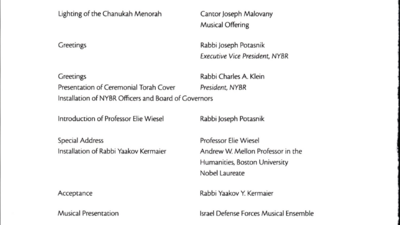
This document is a program for the Installation Ceremony of Rabbi Yaakov Y. Kermaier as the Sixtieth President of The New York Board of Rabbis, held on December 17, 2009 (1 Tevet, 5770). The program outlines the order of events, including a welcome by Walter Molofsky M.D., an anthem led by F. F. Frank Pizarro (FDNY), and a Chanukah Menorah lighting with a musical offering by Cantor Joseph Malovany. Greetings are provided by Rabbi Joseph Potasnik and Rabbi Charles A. Klein. A significant part of the ceremony is the introduction and special address by Nobel Laureate Professor Elie Wiesel, followed by the installation and acceptance speech of Rabbi Yaakov Y. Kermaier. The program also features a musical presentation by the Israel Defense Forces Musical Ensemble and the Israeli National Anthem "Hatikvah," concluding with a Chanukah Celebration.
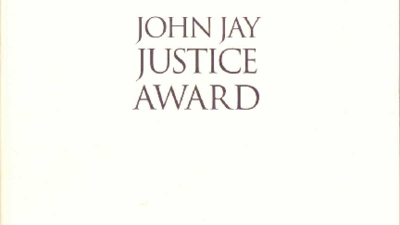
This document is a program for the 2014 John Jay Justice Awards, held on May 6, 2014. The event honors Elie Wiesel for his profound dedication to justice and human rights, a commitment deeply rooted in his experiences as a Holocaust survivor. The program features a welcome message from Jeremy Travis, President of John Jay College, alongside a detailed biography of Wiesel, highlighting his literary works, academic career, and human rights advocacy. It also explains the significance of the John Jay Medal for Justice. The program outlines the ceremony's schedule, including performances and presentations by notable figures such as Stephen G. Breyer, Sir Patrick Stewart, James Earl Jones, Simon Estes, Gil Shaham, Akira Eguchi, Anthony McGill, and Jessye Norman. Biographical sketches of these presenters and participants are provided. The document concludes with acknowledgments to key contributors, including Anne Beane Rudman for underwriting the event and Caroline Stoessinger for producing the program, and lists the members of the John Jay College Foundation Board of Trustees.
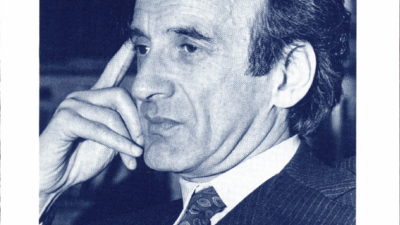
This document is a multi-page invitation and program for a dinner hosted by The National Committee on American Foreign Policy, held on May 7, 1987, at the St. Regis Roof in New York. The event honored Elie Wiesel, the 1986 Nobel Peace Prize Laureate. The document includes a biography of Elie Wiesel, detailing his early life in Romania, education at the Sorbonne, immigration to the United States, and his distinguished career as an author and professor, notably his writings on the Holocaust and his advocacy for human rights. It also lists the individuals and the organization inviting guests to the dinner, as well as the committee's leadership and founding information, established in 1974 to stimulate interest in American foreign policy.
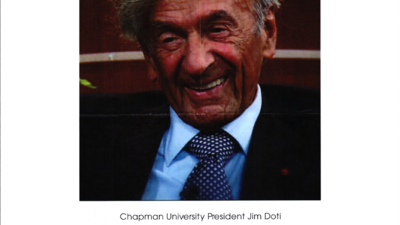
This document is a promotional flyer announcing a television program titled "Dialogue with Doti." The program features Chapman University President Jim Doti in conversation with Elie Wiesel, a prolific author, Nobel Peace Prize recipient, and renowned Holocaust scholar. The flyer indicates that the program will air "TONIGHT AT 8:30 PM" and directs viewers to "WWW.KCET.ORG/DIALOGUEWITHDOTI" for more information. The bottom of the flyer prominently displays the logos for Chapman University and KCET, the latter celebrating "50 YEARS INSPIRING A BETTER STATE."
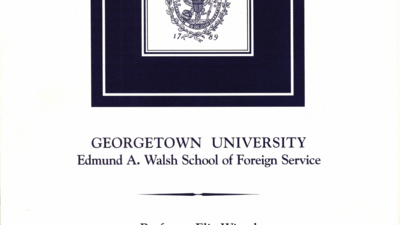
This document is a program for an event held at Georgetown University's Edmund A. Walsh School of Foreign Service on May 1, 2002, featuring Professor Elie Wiesel. The program includes an "Order of Exercise" outlining the welcome, introduction, address by Elie Wiesel, and closing remarks. It provides a detailed biography of Elie Wiesel, highlighting his work as a Nobel Peace Prize laureate, Holocaust survivor, author, teacher, and advocate for human rights and peace. It mentions his various academic positions, awards, and literary works such as "Night." The program also features a section on the Thomas J. Ernst Family, who sponsored Professor Wiesel's visit, detailing their philanthropic activities and biographical information for Thomas J. Ernst, Joanna Valgenti Ernst, Joseph Ernst, and Benjamin Ernst, emphasizing their backgrounds and contributions, particularly in areas of civil rights, education, and humanitarian efforts. The document also includes text from an older honorary degree conferral by Georgetown University to Elie Wiesel.
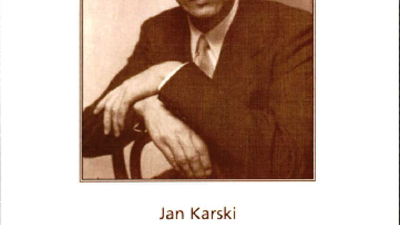
This document is an invitation from the Consulate General of the Republic of Poland in New York, in cooperation with the Georgetown University Alumni Association. It invites recipients to the official designation of "Jan Karski Corner" at the intersection of Madison Avenue and 37th Street, followed by a panel discussion titled "Georgetown Professor Jan Karski: Giving Voice to the Holocaust." The event is scheduled for Thursday, April 16, 2009, at 2:30 PM, and will take place in front of the Consulate's residence at 233 Madison Avenue, New York, NY 10016. The invitation includes RSVP details. The first page features a photograph of Jan Karski and highlights his role as a "Legendary Polish Underground Courier in WWII," "The First to tell the Allies about the Holocaust," and a "Hero of the Polish and Jewish People," also recognized as "A Righteous Among the Nations."